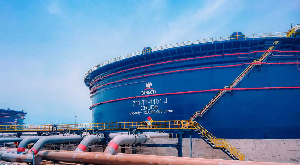The Dangote Petroleum Refinery is operating at unprecedented levels, with output soaring to around 610,000 barrels per day in August 2025, according to the global energy agency Argus.
This marks a sharp rise from earlier months when production hovered around 440,000–450,000bpd.
Benedict George, Editor of the Argus European Products Report, said on a recent podcast that the refinery is “running more reliably and strongly than ever before,” with run rates now “thriving” near full capacity.
A Game-changer in Africa’s downstream market
Last year, many doubted the plant would ever reach its design capacity of 650,000bpd, but Dangote’s steady ramp-up has silenced critics.
Argus even revealed that the refinery is already operating some units above design levels, with executives considering de-bottlenecking to expand capacity further, possibly before the end of 2025.
The refinery’s rapid rise has upended Nigeria’s downstream oil market, where Dangote has become the price setter for petrol.
Its competitive pricing has outpaced rivals and forced trading houses to look beyond Nigeria for business opportunities.
Dangote’s growing capacity has also spilt into West Africa’s fuel trade, displacing European imports that once dominated the region.
Cargoes from the refinery are now supplying neighbouring countries, making Dangote a regional force in fuel distribution.
To strengthen its inland reach, Dangote has acquired thousands of CNG-powered trucks, countering earlier claims that poor road infrastructure would restrict local supply.
According to Argus, this move has cemented the company’s dominance within Nigeria’s domestic fuel market.
Europe’s grip on Africa weakens
Europe’s decades-long dominance in the West African gasoline market is waning.
Nigerian gasoline imports from Europe halved between May and June 2025, falling to under 250,000 tonnes, the lowest in nearly a decade.
Argus reports that Nigeria’s net import position for gasoline is on the verge of flipping, potentially making the country a net exporter as early as this year.
This shift marks a historic reversal, with Dangote redefining Nigeria’s role in the global oil trade.
However, analysts caution that the refinery’s first major maintenance shutdown could disrupt markets.
With its single crude distillation unit (CDU) handling massive volumes, any downtime would cause “a dramatic change in West African trading patterns,” George warned.
Nigeria’s refinery landscape
Dangote’s dominance is amplified by the faltering performance of state-owned facilities.
The Port Harcourt and Warri refineries, briefly revived in late 2024, have since gone offline again, leaving Dangote as the sole large-scale operator in the country.
Although several modular refineries are being developed, their combined capacity of 100,000bpd each is unlikely to significantly alter the market before 2026.
For now, Dangote’s refinery remains the undisputed anchor of Nigeria’s refining sector.
From doubt to dominance
What was once a project mired in scepticism has now emerged as Africa’s most powerful refinery, reshaping trade flows and putting Nigeria on the cusp of fuel self-sufficiency.
Dangote’s success story is not just about hitting production milestones; it is about changing the balance of power in Africa’s oil market.
With expansion on the horizon, the refinery is set to play an even greater role in both regional and global energy supply chains.
450,000 GAIL Refinery takes shape in Ogun
Legit.ng earlier reported that in a transformative move for Nigeria’s energy industry, Gasoline Associates International Limited (GAIL), led by its Chairman and CEO, Lukman Akande Bolaji, has announced the launch of a major refinery project in Ipokia, Ogun State.
The new refinery will begin with a capacity to process 100,000 barrels of crude oil per day, with long-term plans to scale up to 450,000 barrels daily.
Once operational, the refinery will produce critical petroleum products such as Premium Motor Spirit (PMS), Automotive Gas Oil (AGO), Liquefied Petroleum Gas (LPG), and Jet Fuel (ATK), while also delivering petrochemical derivatives to both domestic and international markets.
Business News of Monday, 25 August 2025
Source: www.legit.ng













